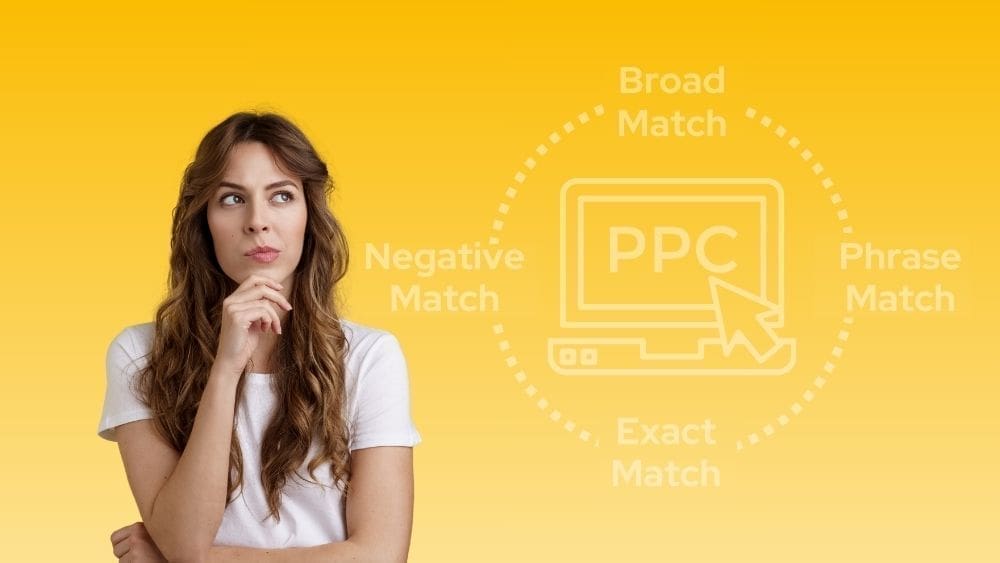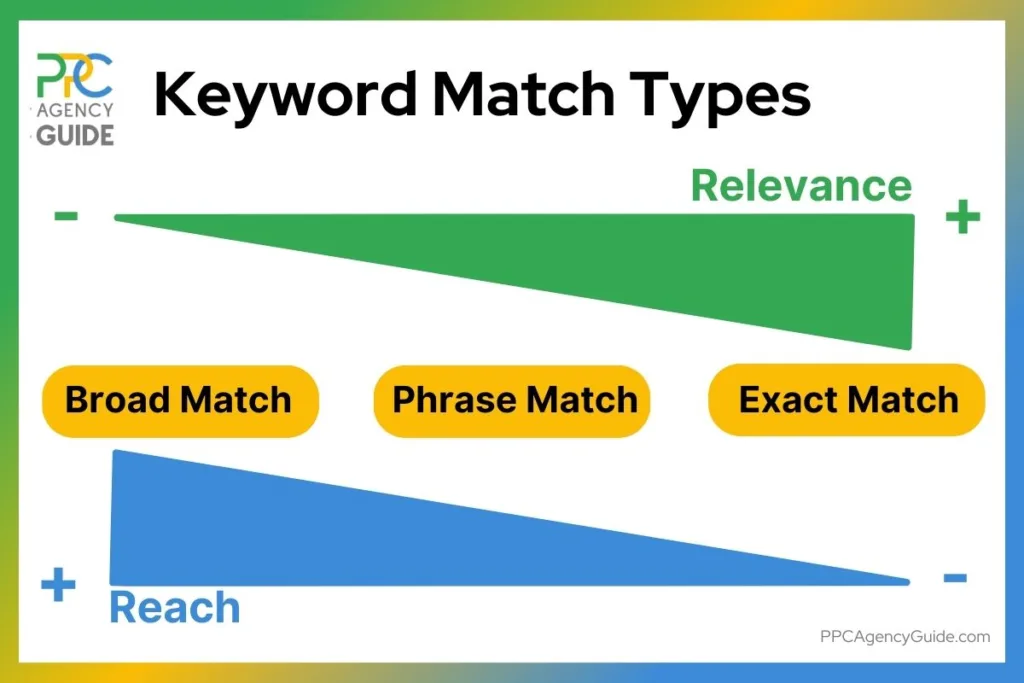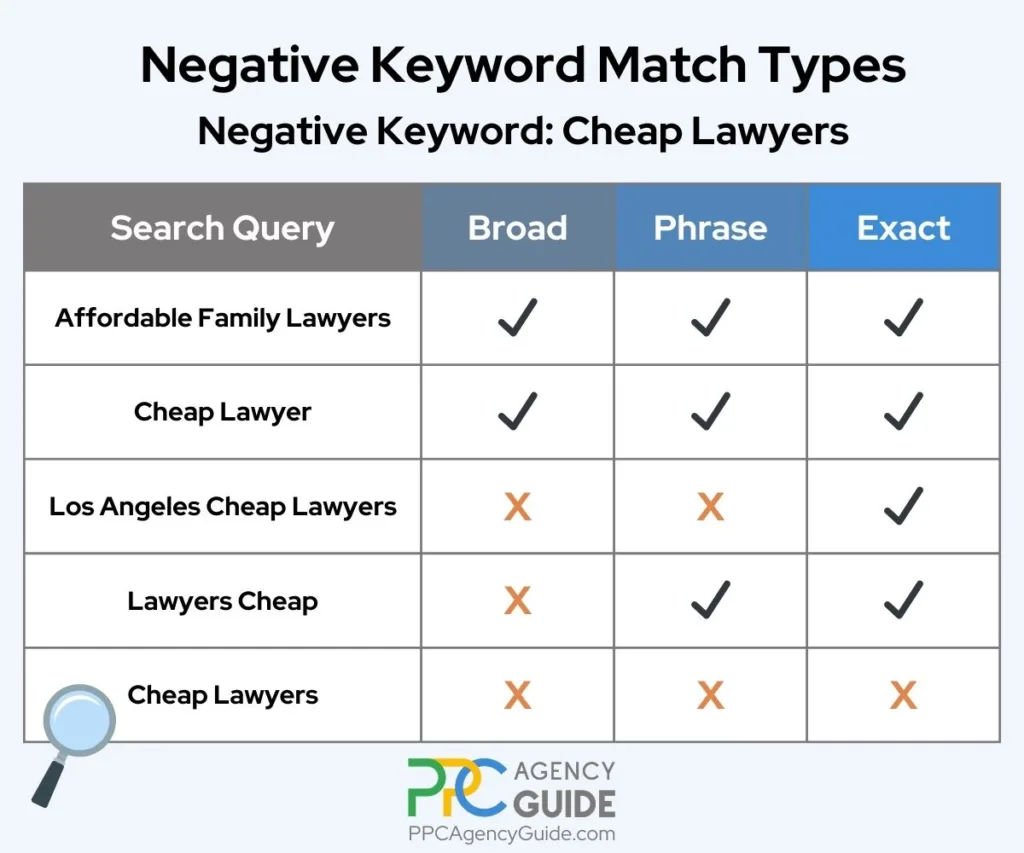
If you have any experience with pay-per-click (PPC), you know how crucial it is to select the right keywords. However, the very same keywords that deliver high-quality leads can just as easily drain your PPC budget by giving you junk clicks and sending you irrelevant traffic. Keyword match types allow you to zero in on the right people.
What Are Keyword Match Types?
Keyword match types help determine what keywords trigger PPC ads to display. They’re more commonly associated with search ads on platforms like Google Ads and Microsoft Advertising. In these cases, the match type determines how closely a user’s search query must be to the keyword in your ad campaign.
However, match types are also used with display ads and video ads. In these cases, the keywords and their respective match types relate to the sites or content on pages on which your ads might display.
- Broad Match: Almost any search query related to the keyword triggers the ad to display.
- Phrase Match: Search queries that are similar to the keyword and that match the intent trigger the ad to display.
- Exact Match: Only search queries that match the keyword exactly or close variants of it trigger the ad to display.
- Negative Match: Keywords may be broad, phrase, or exact match and prevent the ad from displaying if they’re part of the search query.

Understanding Keyword Match Types in Google Ads
Keyword match types in Google Ads are crucial for determining how closely a user’s search query must match your keyword list to trigger your ads. By understanding the different match types, you can optimize your Google Ads campaign for better performance. The main types include broad match, phrase match, and exact match. Broad match is the default match type, allowing your ads to show for searches related to your keywords, even if they don’t match the exact phrase. Regular audits of your keyword match types can help identify opportunities for improvement. Learn how with our PPC Audit Guide.
Phrase match requires the search query to contain the meaning of your keyword, while exact match targets the exact keyword, offering more precise control. Google Ads also uses negative match types like negative phrase match and negative exact match to exclude your ads from showing for irrelevant searches. To optimize your Google Ads account, it’s essential to use keyword research tools to identify the best keywords for PPC and choose the right match types to use based on your campaign goals. You can improve your ad targeting and overall campaign efficiency by leveraging the different keyword match types in Google Ads.
How Do Keyword Match Types Impact PPC Performance?
Keyword match types affect many metrics used to determine PPC success.
Reach
Keyword match types can increase or reduce the number of people who see your ads.
Cost Per Click
Keyword match type is one factor that can impact your cost per click (CPC) Often. Oftentimes, a keyword seen at the end of the sales funnel, when laser-focused by leveraging a keyword match type, will cost more.
Clickthrough Rate
Because keyword match types make it easier to zero in on your audience and create content tailored to the search, you will see more or fewer clicks depending on the match type used.
Invalid Clicks
If more varied queries trigger your ads to display, your ads are more likely to appear when the person isn’t looking for your product or services. That also means you’ll get more “junk clicks” from unrelated searches or unqualified leads.
Cost Per Action/ Cost Per Lead
Naturally, if clicks cost more or it takes more clicks to get a person to take the next step, the cost per action (CPA) or cost per lead (CPL) will rise.
Return on Ad Spend/ Return on Investment
All these metrics impact how much money you get back from your ads. This is referred to as return on ad spend (ROAS) or return on investment (ROI).
The Role of Keyword Match Types in PPC Campaigns
Keyword match types play a vital role in the success of PPC campaigns by determining how closely search queries must match your chosen keywords. Broad match, phrase match, and exact match are the primary match types available, each offering different levels of targeting precision. Broad match type may increase your reach but can lead to irrelevant clicks, making it crucial to monitor your Google Ads campaign closely. Phrase match and exact match types provide more targeted ad delivery, ensuring your ads show only for queries closely related to your keywords. Additionally, using negative broad match and negative phrase match keywords can prevent your ads from showing for unwanted searches, optimizing your ad spend. Effective keyword research and match type selection are essential for maximizing your campaign’s ROI. By understanding the meaning of your keyword and how Google uses match types to show ads, you can choose the right match type for each keyword, balancing reach and relevance. Utilizing keyword research tools can help you refine your keyword list and improve your PPC and SEO strategies, ensuring your ads are seen by the right audience.
Choosing the Right Match Types to Boost Your PPC Performance
Selecting the right match types is crucial for boosting your PPC performance. Each match type offers different benefits and limitations. Broad match type, being the default match type, allows your ads to show for a wide range of search queries related to your keyword. However, this can lead to irrelevant clicks. To mitigate this, use phrase match and exact match keywords, which ensure your ads are triggered by more specific queries. Negative match types, such as negative exact match and negative phrase match, prevent your ads from showing for irrelevant searches, improving targeting efficiency. It’s essential to understand keyword match types explained in detail to choose the right ones for your campaign. Conducting keyword research and match analysis can help identify the best keywords for PPC and the appropriate match types to use. Utilizing tools like Google Ads keyword match types can refine your targeting strategy, ensuring your ads reach the right audience. By integrating different match types and regularly reviewing performance data, you can optimize your keyword targeting, reduce wasted ad spend, and enhance your PPC campaign’s overall effectiveness.
How to Optimize Google Ads Campaigns with Keyword Match Types
Optimizing your Google Ads campaigns involves strategically using keyword match types to ensure your ads show to the most relevant audience. Start by conducting thorough keyword research to build a comprehensive keyword list. Use match types in Google Ads to control how closely search queries must match your keywords. Broad match keywords, including broad match modifiers, can increase visibility but may attract irrelevant traffic. To refine targeting, employ phrase match and exact match keywords, which require search queries to match the exact meaning of your keyword or contain closely related terms.
Additionally, utilize negative match types like negative broad match and negative phrase match to exclude your ads from irrelevant searches. Regularly analyze your campaign performance using Google Ads keyword match types and adjust your keyword targeting accordingly. By integrating multiple match types, you can balance reach and precision, ensuring your ads show to users who are most likely to convert. Best practices include continuously monitoring and refining your keyword match types, using keyword research tools to stay updated with trends, and adjusting bids based on keyword performance. This approach will help you optimize your Google Ads campaigns effectively.
Broad Match Keywords
Broad match is the default setting for keywords in most cases. If a keyword has the broad match designation, searches for just about anything related to that term will trigger the ad to display.
Syntax: How Broad Match Keywords Look
There’s no special syntax for broad match keywords. Let’s say you’re using the keyword Lawyers in Los Angeles. It would look like this:
- Lawyers in Los Angeles
Examples of How Broad Match Keywords Work
If you’re using the broad match keyword Lawyers in Los Angeles, your ad will display when someone searches for:
- Best family lawyers in Los Angeles
- Attorney in Los Angeles
- Lawyers in Los Angeles internships
- Los Angeles lawyer pro bono
Pros of Broad Match Keywords
- You can reach the most people through broad match.
- You can gather a lot of data quickly to use for future keyword planning and optimization initiatives.
Cons of Broad Match Keywords
- You’re likely to get a lot of irrelevant visitors.
- Your budget won’t go as far as it otherwise might.
When to Use Broad Match Keywords
- You’re more concerned with getting a lot of impressions and less about traffic quality.
- Your PPC budget is big enough to absorb some unrelated clicks.
- You’re experimenting with different keywords, and you plan to shift your budget toward high-performing keywords and use negative keywords to weed out unrelated or unqualified clicks.
Phrase Match Keywords
A phrase match keyword will allow ads to display anytime the user’s query has a similar meaning and contains your keyword. The designation is more restrictive than broad match, so your ads display to a more targeted audience.
Syntax: How Phrase Match Keywords Look
Phrase match keywords are placed in quotes. The Lawyers in Los Angeles example would look like this:
- “Lawyers in Los Angeles”
Examples of How Phrase Match Keywords Work
If you’re using the phrase match keyword Lawyers in Los Angeles, your ad will display when someone searches for:
- Lawyers in Los Angeles for businesses
- Top lawyers in Los Angeles reviews
- Best lawyers close to Los Angeles
However, the ad will not display when people search for:
- Paralegal in Los Angeles
- Lawyers in New York
- Legal internships
Pros of Phrase Match Keywords
- You’ll weed out some of the irrelevant traffic.
- Your ads will likely perform better.
Cons of Phrase Match Keywords
- Your audience will still be large and have some irrelevant traffic.
When to Use Phrase Match Keywords
- You use personas, know what your customers want, and want to target them more.
- Quality traffic is a concern, but you still want volume.
Exact Match Keywords
Historically, exact match keywords were just that. If the user’s query did not match the keyword verbatim, the ad did not display. Google pivoted a couple of years ago, and now exact match allows for close variants, too. That means an exact match can also include:
- Plural or singular variants of your keyword (lawyer = lawyers)
- Misspellings (lswyer = lawyer)
- Reordering of the keyword (Bankruptcy Attorney = Attorney Bankruptcy)
- Adding, ignoring, or reordering function words (Attorneys in Los Angeles = Attorneys Los Angeles)
Syntax: How Exact Match Keywords Look
Exact match keywords are placed in brackets. The Lawyers in Los Angeles example would look like this:
- [Lawyers in Los Angeles]
Examples of How Exact Match Keywords Work
If you’re using the exact match keyword Lawyers in Los Angeles, your ad will display when someone searches for:
- Los Angeles Lawyers
- Las Angeles Lawyers
- Lawyers in Los Angeles
However, the ad will not display when the search query does not share the exact meaning or intent.
Pros of Exact Match Keywords
- The traffic you receive is very targeted.
- You can build specific and personalized customer journeys to ensure your content is relevant to readers and they’re more likely to act.
Cons of Exact Match Keywords
- The volume is often much lower.
- You may miss out on some relevant traffic.
When to Use Exact Match Keywords
- You want to reach a very specific audience.
- You have data that shows what your personas are searching for and know your top-performing keywords.
- You’re focused on boosting the efficiency of your campaigns.
- Your PPC budget isn’t big enough to absorb the cost of unrelated or unqualified clicks.
Negative Keyword Match Types
Negative keywords can be added to your campaigns to prevent your ads from displaying for certain searches. These follow the same conventions as general keyword match types: broad, phrase, and exact.
Syntax: How Negative Match Keywords Look
Let’s say your company is focused on quality over price. You don’t want to attract cost-conscious buyers through PPC because they don’t convert. So, you might use the negative keyword cheap lawyers with any match types covered so far. It would look like this:
- Broad Match: cheap lawyers
- Phrase Match: “cheap lawyers”
- Exact Match: [cheap lawyers]
Examples of How Negative Match Keywords Work
Even though you can have broad, phrase, and exact match negative keywords, they work differently than regular keywords. The most notable distinction is that you must add each close variation you want to exclude, Google reports.
Now, let’s look at how the match types for cheap lawyers would impact ad visibility for a couple of different search queries.

The User Searches for: Affordable Family Lawyers
- Broad Match: Ad displays
- Phrase Match: Ad displays
- Exact Match: Ad displays
The User Searches for: Cheap Lawyer
- Broad Match: Ad Displays
- Phrase Match: Ad displays
- Exact Match: Ad displays
The User Searches for: Los Angeles Cheap Lawyers
- Broad Match: Ad does not display
- Phrase Match: Ad does not display
- Exact Match: Ad displays
The User Searches for: Lawyers Cheap
- Broad Match: Ad does not display
- Phrase Match: Ad displays
- Exact Match: Ad displays
The User Searches for: Cheap Lawyers
- Broad Match: Ad does not display
- Phrase Match: Ad does not display
- Exact Match: Ad does not display
Pros of Negative Match Keywords
- More of your budget will go to the keywords your customers actually use.
- Improved targeting can boost your ROI.
Cons of Negative Match Keywords
- You’ll reach fewer potential customers if you use too many negative keywords.
- If you haven’t created negative keywords for each close variant, your ad might still show when you don’t want it to.
- Your ad might still show if someone’s query is longer than 16 words and your keyword is after the 16th word.
- You must continuously update your negative keywords based on search behavior.
When to Use Negative Match Keywords
All campaigns should leverage negative match keywords. Moreover, negative keywords should be updated regularly based on the searches that are actually triggering your ads to display.
Using Negative Keywords to Improve Ad Targeting and Budget Efficiency
Negative keywords are essential for refining your Google Ads targeting, helping to prevent ads from appearing in irrelevant searches and saving on ad spend. By strategically incorporating negative keywords, you ensure that your ads reach only the audiences most likely to engage. This match type filters out unwanted search queries, improving your campaign’s efficiency and helping you avoid clicks that don’t lead to conversions. Regularly updating your negative keywords list based on performance data allows you to keep pace with changes in search behavior and improve targeting.
Choosing the Right Negative Keyword Match Types for Your Campaign
Google Ads allows you to apply different match types to negative keywords, each impacting targeting in unique ways. Negative broad match excludes a wide range of searches containing the unwanted term, making it ideal for blocking irrelevant themes. Negative phrase match excludes queries that contain your keyword in the exact order you specify, while negative exact match excludes only the precise search phrase. This level of control allows you to manage ad relevance more effectively and reach the right audience by balancing reach and specificity.
Leveraging PPC Keyword Tools for Negative Keyword Research
Effective negative keyword management starts with solid research. Free keyword tools and PPC tools can help identify terms and phrases that may drain your budget without adding value. These tools provide valuable insights by suggesting keyword ideas, showing common irrelevant terms in your niche, and allowing you to refine your negative keyword strategy. By identifying and applying these terms, you reduce wasted ad spend and increase your campaign’s relevance.
Best Practices for Using Keyword Match Types in PPC and SEO
Implementing best practices for keyword match types in PPC and SEO is essential for maximizing your campaign’s impact. Begin with comprehensive keyword research to identify relevant keywords for your PPC and SEO strategies. Use keyword match types in Google Ads to fine-tune your targeting. Broad match keywords can help increase visibility but should be monitored to avoid irrelevant clicks. Phrase match and exact match types offer more precise targeting, ensuring your ads show for queries closely related to your keyword list. Incorporate negative phrase match and negative broad match keywords to exclude unwanted traffic and optimize your budget. Regularly update your keyword targeting based on performance data and trends identified through keyword research tools. In SEO, integrate keywords naturally within your content while ensuring they match user intent. Combining PPC and SEO efforts can enhance overall visibility and drive more qualified traffic to your site. By understanding and applying keyword match types explained through best practices, you can improve your ad targeting, reduce costs, and achieve better ROI. Continuous optimization and strategic use of multiple match types will keep your campaigns competitive and effective.
Bring on a Pro to Manage Your Keyword Match Types
Using the right keyword match types consistently can seem complicated, but it dramatically impacts the success of your PPC campaigns. If you need help with keyword match types or any other aspect of your PPC management, request a complimentary consultation.


















